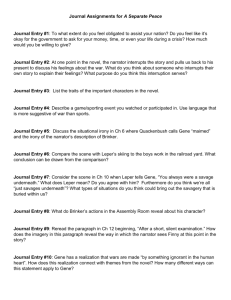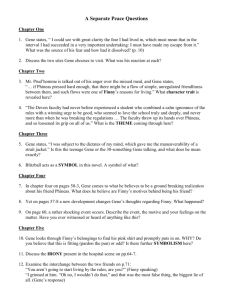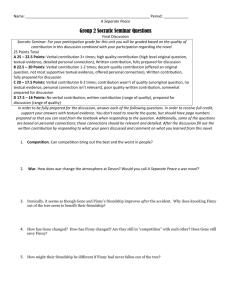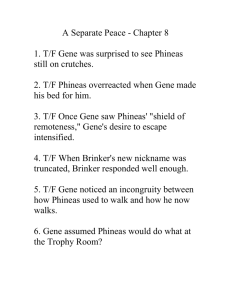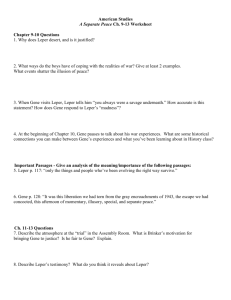A Separate Peace - Ms. Auchinleck`s English Treasure Trove
advertisement
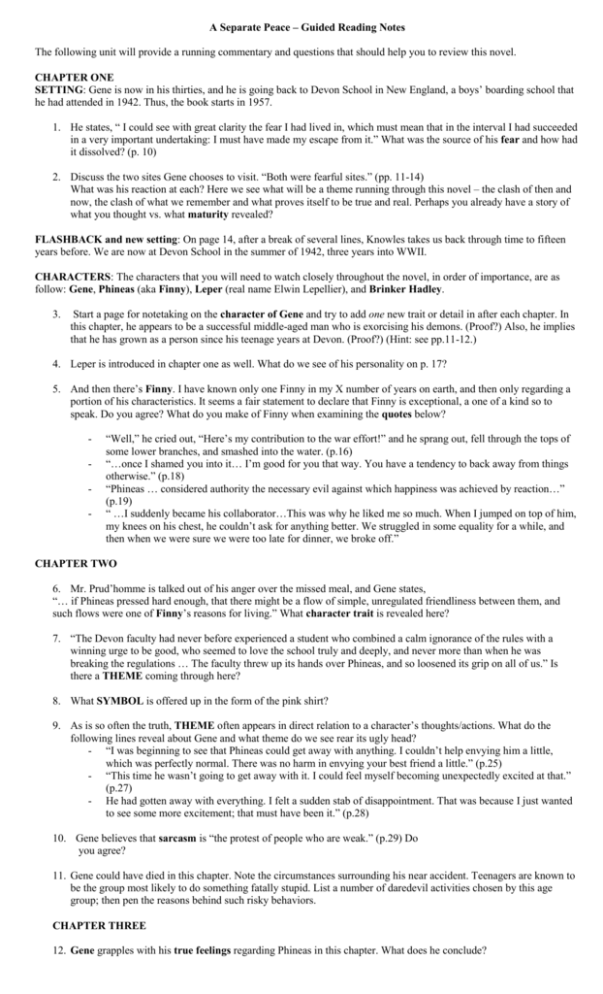
A Separate Peace – Guided Reading Notes The following unit will provide a running commentary and questions that should help you to review this novel. CHAPTER ONE SETTING: Gene is now in his thirties, and he is going back to Devon School in New England, a boys’ boarding school that he had attended in 1942. Thus, the book starts in 1957. 1. He states, “ I could see with great clarity the fear I had lived in, which must mean that in the interval I had succeeded in a very important undertaking: I must have made my escape from it.” What was the source of his fear and how had it dissolved? (p. 10) 2. Discuss the two sites Gene chooses to visit. “Both were fearful sites.” (pp. 11-14) What was his reaction at each? Here we see what will be a theme running through this novel – the clash of then and now, the clash of what we remember and what proves itself to be true and real. Perhaps you already have a story of what you thought vs. what maturity revealed? FLASHBACK and new setting: On page 14, after a break of several lines, Knowles takes us back through time to fifteen years before. We are now at Devon School in the summer of 1942, three years into WWII. CHARACTERS: The characters that you will need to watch closely throughout the novel, in order of importance, are as follow: Gene, Phineas (aka Finny), Leper (real name Elwin Lepellier), and Brinker Hadley. 3. Start a page for notetaking on the character of Gene and try to add one new trait or detail in after each chapter. In this chapter, he appears to be a successful middle-aged man who is exorcising his demons. (Proof?) Also, he implies that he has grown as a person since his teenage years at Devon. (Proof?) (Hint: see pp.11-12.) 4. Leper is introduced in chapter one as well. What do we see of his personality on p. 17? 5. And then there’s Finny. I have known only one Finny in my X number of years on earth, and then only regarding a portion of his characteristics. It seems a fair statement to declare that Finny is exceptional, a one of a kind so to speak. Do you agree? What do you make of Finny when examining the quotes below? - “Well,” he cried out, “Here’s my contribution to the war effort!” and he sprang out, fell through the tops of some lower branches, and smashed into the water. (p.16) “…once I shamed you into it… I’m good for you that way. You have a tendency to back away from things otherwise.” (p.18) “Phineas … considered authority the necessary evil against which happiness was achieved by reaction…” (p.19) “ …I suddenly became his collaborator…This was why he liked me so much. When I jumped on top of him, my knees on his chest, he couldn’t ask for anything better. We struggled in some equality for a while, and then when we were sure we were too late for dinner, we broke off.” CHAPTER TWO 6. Mr. Prud’homme is talked out of his anger over the missed meal, and Gene states, “… if Phineas pressed hard enough, that there might be a flow of simple, unregulated friendliness between them, and such flows were one of Finny’s reasons for living.” What character trait is revealed here? 7. “The Devon faculty had never before experienced a student who combined a calm ignorance of the rules with a winning urge to be good, who seemed to love the school truly and deeply, and never more than when he was breaking the regulations … The faculty threw up its hands over Phineas, and so loosened its grip on all of us.” Is there a THEME coming through here? 8. What SYMBOL is offered up in the form of the pink shirt? 9. As is so often the truth, THEME often appears in direct relation to a character’s thoughts/actions. What do the following lines reveal about Gene and what theme do we see rear its ugly head? - “I was beginning to see that Phineas could get away with anything. I couldn’t help envying him a little, which was perfectly normal. There was no harm in envying your best friend a little.” (p.25) - “This time he wasn’t going to get away with it. I could feel myself becoming unexpectedly excited at that.” (p.27) - He had gotten away with everything. I felt a sudden stab of disappointment. That was because I just wanted to see some more excitement; that must have been it.” (p.28) 10. Gene believes that sarcasm is “the protest of people who are weak.” (p.29) Do you agree? 11. Gene could have died in this chapter. Note the circumstances surrounding his near accident. Teenagers are known to be the group most likely to do something fatally stupid. List a number of daredevil activities chosen by this age group; then pen the reasons behind such risky behaviors. CHAPTER THREE 12. Gene grapples with his true feelings regarding Phineas in this chapter. What does he conclude? 13. Gene states, “I was subject to the dictates of my mind, which gave me the maneuverability of a strait jacket.” Is this the teenage Gene or the 30-something Gene talking, and what does he mean exactly? 14. Blitzball acts as a SYMBOL in this novel. A symbol of what? 15. How are the characters of Phineas, Gene, Leper, Bobby Zane, and Chet shown through their approach to this game? 16. “Finny could shine with everyone, he attracted everyone he met. I was glad of that too. Naturally. He was my roommate and my best friend.” Do you read anything between the lines here on page 40? 17. Gene tells us on page 42 that Finny “had tremendous loyalty to the class, as he did to any group he belonged to, beginning with him and me and radiating outward past the limits of humanity toward spirits and clouds and stars.” And if this did not have enough of a wow factor, he goes on to describe a bizarre incident that takes place in the school’s pool. What happened there, and what does it show about Gene’s buddy Finny? 18. On page 48, Phineas admits that Gene is his “best pal”. Do you think that this is an easy thing for one guy to say to another? What about girl to girl? Why did Gene not say it back? “Perhaps I was stopped by that level of feeling, deeper than thought, which contains the truth.” CHAPTER FOUR 19. In chapter four on pages 50-3, Gene comes to what he believes to be a ground breaking realization about his friend Phineas. What does he believe are Finny’s motives behind being his friend? 20. Yet on pages 57-8 a new development changes Gene’s thoughts regarding Finny. What happened? 21. “He had never been jealous of me for a second. Now I knew that there never was and never could have been any rivalry between us. I was not of the same quality as he. I couldn’t stand this. AT THIS POINT IN THE NOVEL I WANT YOU TO STOP AND FILL IN THE BLANKS: Finny is __________________________________. Gene is ___________________________________. Furthermore, with which character would most of us find ourselves comparable? 22. On page 60, a rather shocking event occurs. Describe the event, the motive and your feelings on the matter. Have you ever witnessed or heard of anything like this? CHAPTER FIVE 23. Gene looks through Finny’s belongings to find his pink shirt and promptly puts in on. WHY? Do you believe that this is fitting (pardon the pun) or odd? Is there further SYMBOLISM here? 24. Discuss the IRONY present in the hospital scene on pp.64-7. 25. Examine the interchange between the two friends on p.71: “You aren’t going to start living by the rules, are you?” (Finny speaking) “I grinned at him. “Oh no, I wouldn’t do that,” and that was the most false thing, the biggest lie of all. (Gene’s response) CHAPTER SIX 26. How has Phineas’s accident and the end of summer affected Gene? 27. We are introduced to two new characters in this chapter – Brinker Hadley (p.74) and Quackenbush (p.76). Write a short note on each of them. 28. Phineas declares, “Listen, pal, if I can’t play sports, you’re going to play them for me, and I lost part of myself to him then, and a soaring sense of freedom revealed that this must have been my purpose from the first: to become a part of Phineas.” Comment on this statement. Does it offer CHARACTER DEVELOPMENT? THEME? CHAPTER SEVEN 29. What happens as a result of banter on pages 88-91? 30. What do we note about Leper in this chapter? About Quackenbush? About Brinker? *****Do you notice a parallel to Catcher In The Rye here?***** 31. Explain what Gene means when he says, “The war would be deadly all right. But I was used to finding something deadly in things that attracted me; there was always something deadly lurking in anything I wanted, anything I loved. And if it wasn’t there, as for example with Phineas, then I put it there myself.” Is there a THEME about human nature lurking beneath these words??? CHAPTER EIGHT 32. The DRAMATIC IRONY is just too much here. Discuss the joke that won’t go away. (p.106) 33. At the mention of Gene enlisting, Finny’s eyes “turned with an odd expression… I had never seen such a look in them before.” What might this look be? 34. On page 109, Gene states, “peace had come back to Devon for me.” Why? 35. Both Gene and Phineas step out of character in this chapter. How and why? CHAPTER NINE 36. As revealed on pages 123-7, what type of individual is Leper? 37. As yet another SYMBOL in this story, what does Winter Carnival represent? Pages 132 and 133 contain several statements about Finny that this reader loves to share: “Phineas sat behind the table in a heavily carved black walnut chair; the arms ended in two lions’ heads, and the legs ended in paws gripping wheels now sunk in the snow. Phineas had made the purchase that morning. Phineas bought only on impulse and only when he had money, and since the two states rarely coincided his purchases were few and strange.” (p.132) “Phineas had one of those minds which could record what is happening in the background and do nothing about it simply because something else was preoccupying him.” (p.133) 38. Finny’s dance may also be SYMBOLIC. Of what? 39. From page 137, draw a conclusion regarding the meaning behind the title of the book. CHAPTER TEN 40. This is Leper’s chapter. (a)How has he changed? (a) How does he rock Gene’s world? (b) Analyze his story on pp. 149-51. What conclusions can you draw? CHAPTER ELEVEN 41. Throughout this book, and in this chapter war and peace are side by side. How is this so on pages 153-4? 42. What is IRONIC about the interchange between Gene and Phineas on page 155? 43. On page 158, Phineas lets go of a ruse he had clung to since his return to Devon. How so? 44. On page 160, Brinker brings up Finny’s accident and leaves Gene with somewhat of a threat. This threat blooms on pp.165 and on. What is Brinker’s MOTIVATION? 45. Who might the voices be on pages 169-70? 46. On page 171, Finny tries to be true friend, as he has always been to Gene. Note how this is so. Then why does he provide the information that Leper is at Devon that day (MOTIVATION)? 47. Who is responsible for Finny’s horrific fall down the white marble staircase? What THEME is offered here? CHAPTER TWELVE 48. You’ve been with Phineas for twelve chapters now, right up to the end of his short life. Could he be for real? To whom, living or dead, would you compare this young man? 49. “Once again I had the desolate sense of having all along ignored what was finest in him.” Is this often the way it is? Is there a THEME here? 50. This whole chapter uses physical details of setting to enhance mood. Show that this is so. 51. Recount the last meeting of the two friends. What does Gene recognize in Finny? What must Finny understand about Gene in order to renew their friendship? 52. Identify the climax in this chapter? Were there other high emotional points prior to this last agonizing one? 53. It is not cliché to say that a part of Gene had died as well. Explain. CHAPTER THIRTEEN 54. Mr. Hadley is a character that leaks IRONY every time he opens his mouth. Support this statement. (pp.198-200) THEME Through Gene, Knowles offers us a clear theme at the end of his book: “Because it seemed clear that wars were not made by generations and their special stupidities, but that wars were made instead by something ignorant in the human heart.” (p.201) 56.Comment on the parallel between Gene’s Phineas and Holden’s Allie. (p.202) 57. Noteworthy: “My fury was gone, I felt it gone, dried up at the source, withered and lifeless. Phineas had absorbed it and taken it with him, and I was rid of it forever.” (p.203) So what was Finny to Gene? 58. Put into your own words the FIVE attitudes people exhibit when facing a (perceived) threat. [Which stance have you ever chosen?] Base your list upon the behavior of people generally, Mr. Ludsbury, Quackenbush, Brinker, and Leper, as set down by Gene at the end of the book 59.Do you feel that this book deserves the notoriety of being “an undisputed American classic”? Why or why not?
